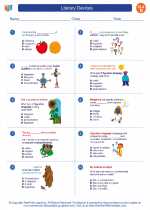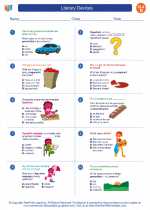Irony
Irony is a literary technique in which an outcome is different from what was expected. It is often used to create humor, emphasize a point, or reveal a contrast between reality and perception. There are several types of irony, including verbal irony, situational irony, and dramatic irony.
Verbal Irony
Verbal irony occurs when a person says one thing but means another. This can involve sarcasm or the use of words to convey a meaning that is the opposite of the literal meaning.
Situational Irony
Situational irony occurs when the outcome of a situation is different from what was expected. This can create a sense of surprise or shock for the reader or audience.
Dramatic Irony
Dramatic irony occurs when the audience or reader knows something that the characters in the story do not. This creates tension and anticipation as the characters remain unaware of the true situation.
Study Guide
- What is irony?
- What are the three types of irony?
- Give an example of verbal irony.
- Provide an example of situational irony.
- Explain dramatic irony.
Irony is a literary technique in which an outcome is different from what was expected.
The three types of irony are verbal irony, situational irony, and dramatic irony.
"Oh, fantastic! I love getting stuck in traffic," said with a sarcastic tone when actually feeling frustrated.
A fire station burns down.
Dramatic irony occurs when the audience or reader knows something that the characters in the story do not.
[Irony] Related Worksheets and Study Guides:
.◂English Language Arts Worksheets and Study Guides Fourth Grade. Literary Devices

 Worksheet/Answer key
Worksheet/Answer key
 Worksheet/Answer key
Worksheet/Answer key
